The Elusive Nature of the Hispanic CategoryPosted in Articles, Census/Demographics, Latino Studies, Media Archive, United States on 2016-04-04 00:57Z by Steven |
The Elusive Nature of the Hispanic Category
Brown Political Review
Providence, Rhode Island
2016-04-02
Shavon Bell, US Section Staff Writer
By 2060, 115 percent more Americans will be of Hispanic origin than in 2015. Consequently, pundits identify “the Hispanic vote” as the next frontier for ensuring political success. Political elites have thus scrambled to investigate, quantify, and draw conclusions about this group in any way possible. They have asked Hispanic respondents about their political beliefs on a range of issues — principally, immigration — in an effort to define the policy matters that are most salient to Latinxs in the United States. This analysis propagates throughout campaign teams, interest groups, academia, and journalism, heavily influencing judgments about the allegiances of the Hispanic community. But, a central and largely unacknowledged point about mainstream political discourses regarding Hispanics are the inherent flaws in defining the Hispanic category itself. Because of distinct colonial histories between Latin America and the United States and between different nations within Latin America, the American mainstream cannot and should not assume that Latinxs identify themselves using American conceptions of race. At present, this mode of analysis only functions to restrict the Hispanic ethnic category, and prevents America from having substantive discussions about what it actually means to be part of the Latinx community.
The broadest racial categories in Latin America, such as indígeno (indigenous), blanco (white), negro (black), or mestizo (mixed race), to name only a few, arose because of the impact of Iberian colonial conquests on the native peoples and lands of the Americas. As the Spanish and Portuguese colonialists built up plantations, churches, and households, they violently reshaped populations and socially constructed entire racial categories. In this way, conquistadors and subsequent European colonialists initiated the dynamics of racial oppression, struggle, and complicity that endure in contemporary Latin America…
Read the entire article here.
